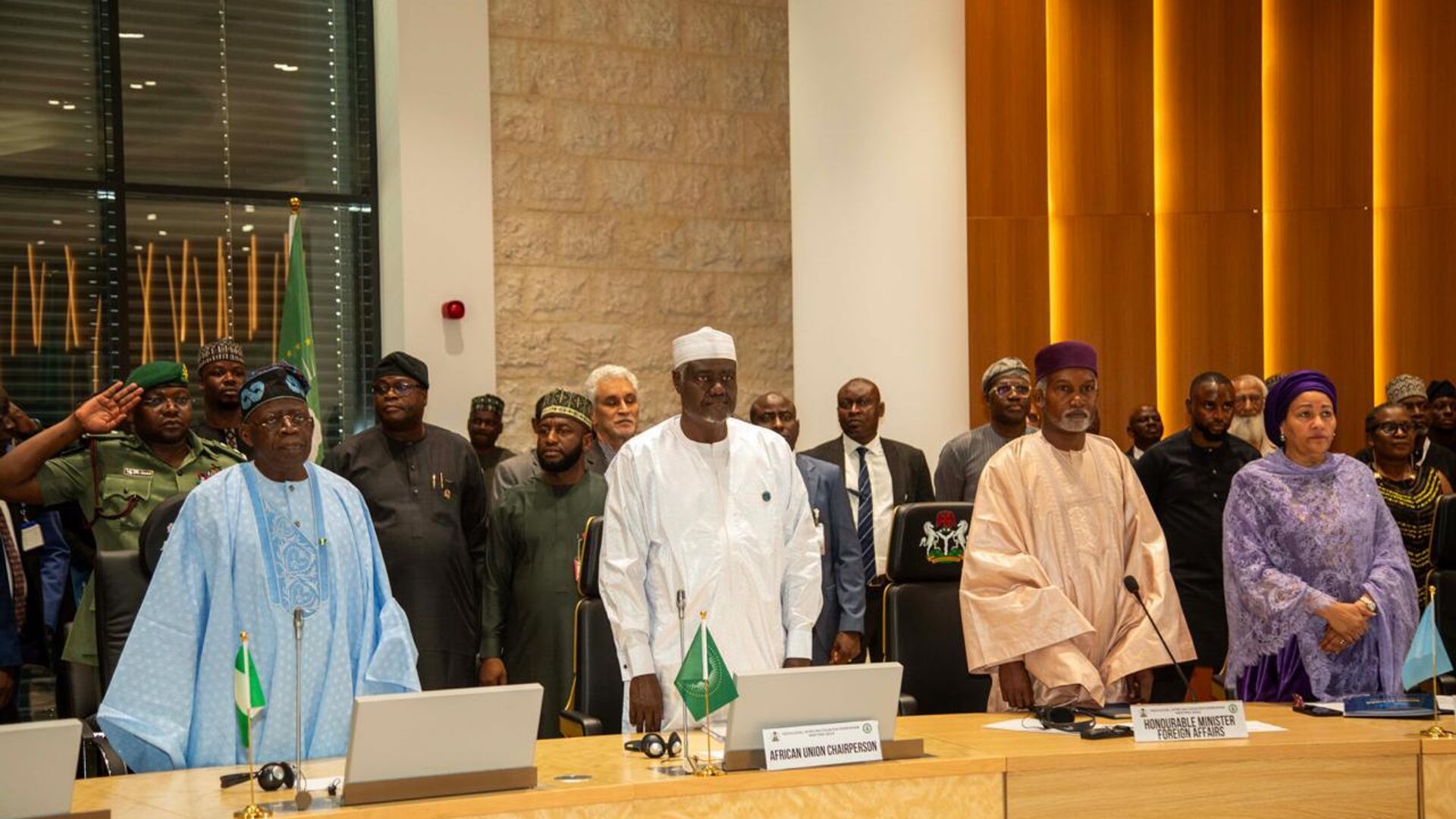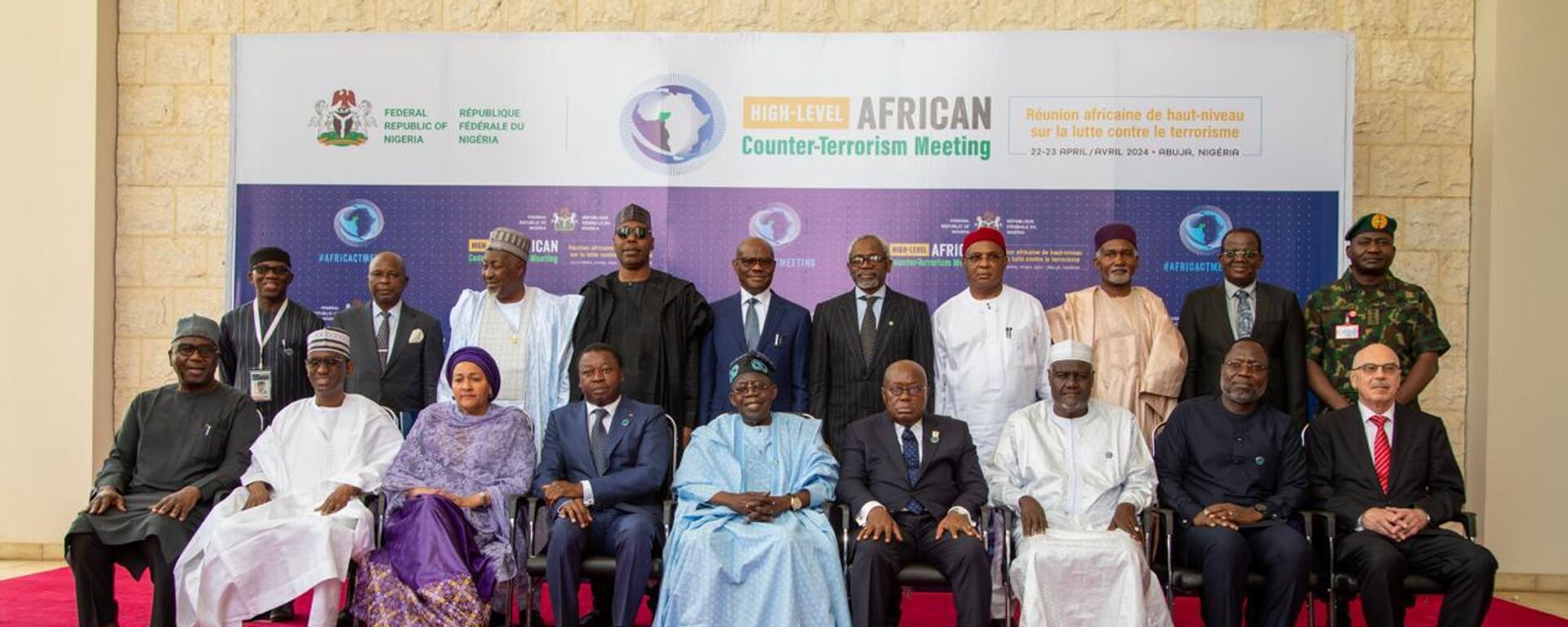https://en.sputniknews.africa/20240423/african-leaders-advocate-for-reassessment-of-strategies-to-address-violent-extremism-1066194775.html
African Leaders Advocate for Reassessment of Strategies to Address Violent Extremism
African Leaders Advocate for Reassessment of Strategies to Address Violent Extremism
Sputnik Africa
For years, Africa's Sahel region has been facing the threat of terrorism, with groups that have committed various crimes, ranging from mass killings and... 23.04.2024, Sputnik Africa
2024-04-23T13:54+0200
2024-04-23T13:54+0200
2024-04-23T15:01+0200
nigeria
daesh (isis)
mozambique
terrorism
fighting terrorism
sub-saharan africa
moussa faki
bola tinubu
united nations (un)
togo
https://cdn1.img.sputniknews.africa/img/07e8/04/17/1066195726_0:31:1280:751_1920x0_80_0_0_6cbbe9f01a0e42ec630113b9af333211.jpg
During a security forum in Nigeria, African leaders advocated for a restructuring of institutions dedicated to combating violent extremism in Africa and proposed the establishment of a standby military force and more control over peacekeeping initiatives.Togolese President Faure Gnassingbe stated that while the Sahel region experienced the highest number of attacks on civilians, coastal states such as Togo were encountering increasing threats.Thus, he urged the creation of "efficient institutions" to battle the threat while calling for interstate cooperation.Furthermore, according to Moussa Faki, the chairperson of the African Union Commission, the average frequency of daily assaults carried out by extremists in Africa increased to eight and 44 deaths last year. This is a significant rise from the previous period of 2017 to 2021, during which there were four attacks and 18 deaths reported on a daily basis.A total of 7,000 civilians and 4,000 military men lost their lives last year, Faki noted, emphasizing the need for more investment in Africa to effectively combat the proliferation of terrorism.Amina Mohammed, the Deputy Secretary-General of the United Nations, stated that the Sahel region is responsible for 50% of the total global deaths resulting from acts of terrorism.Moreover, Nigerian President Bola Tinubu called for the establishment of a regional anti-terrorism center in Africa and recalled the importance of implementing the long-proposed idea of creating a rapid reaction force on the continent.He also urged action to stop the proliferation of small arms and light weapons in African countries and highlighted the importance of addressing the roots of terrorism, which are "poverty, inequality and social injustice."On April 22-23, a high-level African counter-terrorism summit was held under the theme "Strengthening Regional Cooperation and Institution Building to Address the Evolving Threat of Terrorism" in the Nigerian capital Abuja with the support of the UN Office of Counter-Terrorism.Its goal is to strengthen multilateral cooperation in the fight against terrorism and change the collective response of the international community, according to the Nigerian presidency. The event will also help deepen regional cooperation and strengthen the institutional capacity of member states.The summit is attended by heads of state and government, high-ranking government officials, representatives of international organizations and multilateral institutions.
https://en.sputniknews.africa/20240422/nigerian-president-tinubu-calls-for-creation-of-regional-anti-terrorism-center-in-africa-1066186601.html
nigeria
mozambique
togo
west africa
Sputnik Africa
feedback@sputniknews.com
+74956456601
MIA „Rossiya Segodnya“
2024
Christina Glazkova
https://cdn1.img.sputniknews.africa/img/07e7/0b/07/1063380906_0:0:673:674_100x100_80_0_0_79628b4d0cd9f29291a57aa13bbf9e7a.jpg
Christina Glazkova
https://cdn1.img.sputniknews.africa/img/07e7/0b/07/1063380906_0:0:673:674_100x100_80_0_0_79628b4d0cd9f29291a57aa13bbf9e7a.jpg
News
en_EN
Sputnik Africa
feedback@sputniknews.com
+74956456601
MIA „Rossiya Segodnya“
Sputnik Africa
feedback@sputniknews.com
+74956456601
MIA „Rossiya Segodnya“
Christina Glazkova
https://cdn1.img.sputniknews.africa/img/07e7/0b/07/1063380906_0:0:673:674_100x100_80_0_0_79628b4d0cd9f29291a57aa13bbf9e7a.jpg
nigeria, daesh (isis), mozambique, terrorism, fighting terrorism, moussa faki, bola tinubu, united nations (un), togo, terrorist attack, west africa
nigeria, daesh (isis), mozambique, terrorism, fighting terrorism, moussa faki, bola tinubu, united nations (un), togo, terrorist attack, west africa
African Leaders Advocate for Reassessment of Strategies to Address Violent Extremism
13:54 23.04.2024 (Updated: 15:01 23.04.2024) Christina Glazkova
Writer / Editor
For years, Africa's Sahel region has been facing the threat of terrorism, with groups that have committed various crimes, ranging from mass killings and kidnapping of civilians to drug trafficking and arms smuggling.
During a security forum in Nigeria, African leaders advocated for a restructuring of institutions dedicated to combating violent extremism in Africa and proposed the establishment of a standby military force and more control over peacekeeping initiatives.
Togolese President Faure Gnassingbe stated that while the Sahel region experienced the highest number of attacks on civilians, coastal states such as
Togo were encountering increasing threats.
"I say this with prudence and regret, but I think the institutions that have been in place for a number of decades are no longer able to respond to the security situation that we face," said Gnassingbe.
Thus, he urged the creation of "efficient institutions" to battle the threat while calling for
interstate cooperation.
"Faced with the security threats plaguing the West African sub-region, Sahel and other regions, we must insist on interstate cooperation with a synergy of action between the defense and security forces as well as establishment of efficient institutions in the context of the reorganization of global balances," he posted on X.
Furthermore, according to
Moussa Faki, the chairperson of the African Union Commission, the average frequency of daily assaults carried out by extremists in Africa increased to eight and 44 deaths last year. This is a significant rise from the previous period of 2017 to 2021, during which there were four
attacks and 18 deaths reported on a daily basis.
A total of 7,000 civilians and 4,000 military men lost their lives last year, Faki noted, emphasizing the need for more
investment in Africa to effectively combat the proliferation of
terrorism.
Amina Mohammed, the Deputy Secretary-General of the
United Nations, stated that the Sahel region is responsible for 50% of the total global deaths resulting from acts of terrorism.
"The situation in Africa, particularly in the Sahel, is dire, with some of the most violent terrorist groups operating in the Sahel; the region's now accounting for almost half of all deaths from terrorism globally," she said.
Moreover, Nigerian President Bola Tinubu called for the establishment of a regional anti-terrorism center in Africa and recalled the importance of implementing the long-proposed idea of creating a rapid reaction force on the continent.
He also urged action to stop the proliferation of
small arms and light weapons in African countries and highlighted the importance of addressing the roots of terrorism, which are "poverty, inequality and social injustice."
On April 22-23, a high-level African counter-terrorism summit was held under the theme "Strengthening Regional Cooperation and Institution Building to Address the Evolving Threat of Terrorism" in the Nigerian capital Abuja with the support of the UN Office of Counter-Terrorism.
Its goal is to strengthen multilateral cooperation in the fight against terrorism and change the collective response of the international community, according to the
Nigerian presidency. The event will also help deepen regional cooperation and strengthen the institutional capacity of member states.
The summit is attended by heads of state and government, high-ranking government officials, representatives of international organizations and multilateral institutions.



